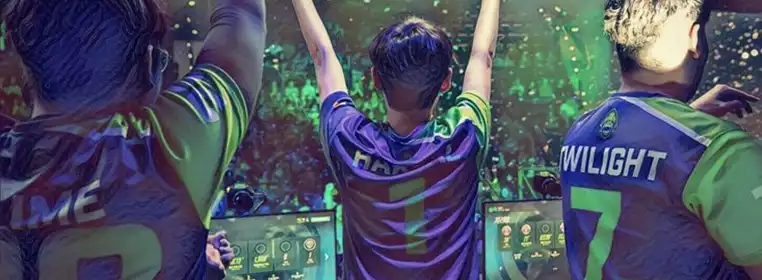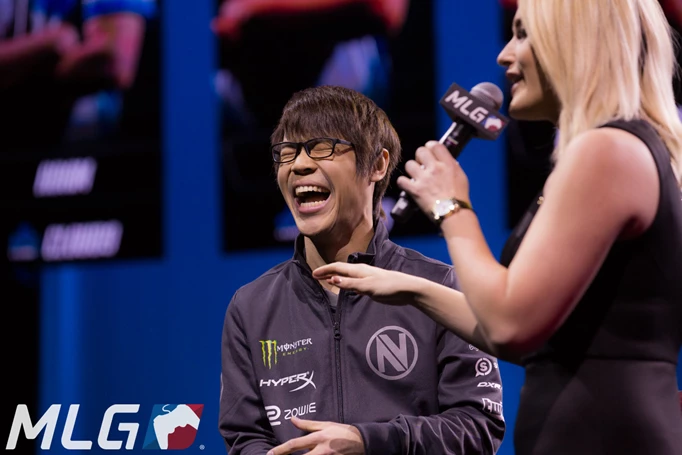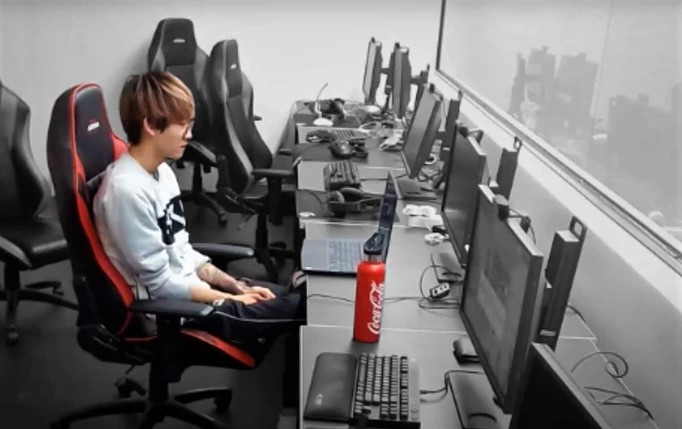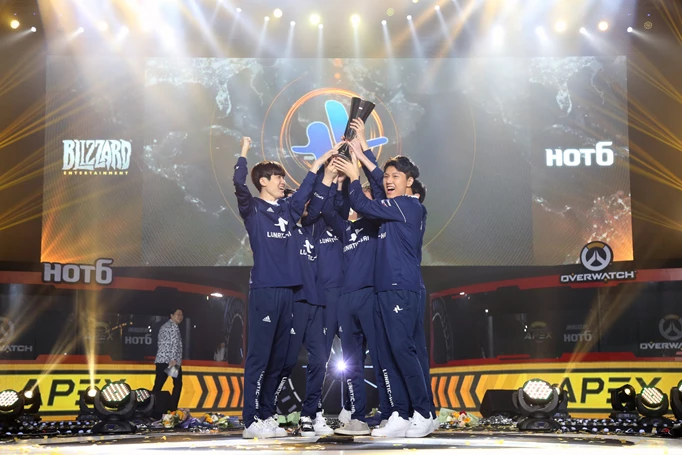The Overwatch League Needs Its Own 'Beyond The Game'

What really captivated the Overwatch community during its days as a fledgeling esports title, before the major investment, before the Overwatch League era? Those golden years are what many fans of the title look back fondly on and speak highly of, but what exactly sat at the core of that experience? What mix of sugar, spice, and everything nice, brought us such loving memories for OGN’s Overwatch APEX or MLG Vegas or APAC 2016?
Funnily enough, a 2008 Dutch documentary about a game that sits at the heart of modern esports perfectly exemplifies what we’re all missing.

 Click to enlarge
Click to enlargeWarcraft 3 was released July 3, 2002 and stands as the grandfather to modern esports. Ahead of its time, its custom game feature and “world editor” popularised some of the mods that gave birth to some of the biggest titles in esports today. The documentary, “Beyond the Game” focuses on this game in particular and inserts us in the midst of the World Cyber Games; an esports event lost to time whose motto reflects the title of the documentary and one who spawned a song of the same name. The documentary focuses on Warcraft 3 legends Manuel “Grubby” Schenkhuizen and Li “Sky” Xiaofeng with a supporting cast of other famed players for their time.
To put in bluntly; Beyond the Game is a slow and quiet film but one that captures the essence of what pro-gaming was like in 2008 and acts as a reflective point for future generations. It is a transparent look at the people behind the handles, a true crystalline glimpse into who these people are. Wheat from chaff, players from handles. No overly produced filters, no spinning wheel of drama, no constant appeals to the viewer to remind them that this about “video gamers” and their wacky new-fangled “jobs”, just a quiet insight into two peoples’ lives. The documentary is more about Manuel Schenkhuizen and Li Xiaofeng, the people, and less about Grubby and Sky the professional Warcraft 3 players.
Something the Overwatch ecosystem could use a healthy dose of.

 Click to enlarge
Click to enlargeEsports in the mainstream is becoming more and more accepted, but its explanation is much more exciting than what it actually is. Many try to paint pro gamers as the new-age rock stars, earning millions by doing what millions do in their spare time; playing video games—what could be better than that? However, this small, quaint documentary team captured something touching, something that comes across in nearly every shot of the film; that buttery cinnamon and sugar wholesomeness of humanisation.
- Read More - The Lights Dim In New York City
The buzzing lights, crowds of adoring fans, the fame, the fortune, it was all replaced with quiet moments with people, not parties and drama with players. Now, we can’t ignore the life they lead is one that is exciting—it is inherent to the job—but the thesis is always held constant; what lies beyond the game. Who are these people? What are their lives like? Where did they come from? What was childhood like?
The often slow, panning shots, shots that almost linger too long, focus on the contrasting nature of the subjects in the frame. Each car ride, each monotonous task away from their passion, each of these shots perfectly exemplifies what it is—work. These are people at work. It isn’t always glitz, glamour, and spotlights. Sometimes it’s a nine to five; sometimes it’s the dull annoyance of travelling on business, sometimes it’s having meetings with clients and sponsors alike.
A lot like what many of us experience—just with a different vehicle.
Something like Beyond the Game serves as a beautiful anthesis to what the Overwatch League feels like, something it should take note of and learn from its lessons.
In a vacuum, they are tedious chores our eyes have to endure, but our brains connect the dots. We’ve been in those situations, we’ve experienced—even if in a small dose—what they go through. We’re not pro gamers, but we can relate because they are human. None of these aspects involves playing on stage in front of millions and winning championships, this is work, and the film is shot to show you that. It’s slow and drawn out—because that’s life. Sure you have your highlights, and the third act of the film serves that purpose, but that’s exactly what they are; small, impactful moments flanked by a mass of preparation and practice and hard work.
The intimate exchanges between both Grubby and Sky after their match feels more like watching two men on differing ends of a job interview. Grubby is left confused; he asks his significant other on her thoughts on what he should have done differently and laments on all the effort he put into losing. Sky, on the other hand, has a brief but excited and jovial conversation with his girlfriend about beating Grubby and the coming grand final match. One landed the job; the other did not. It’s not as fantastical as all the headlines paint it and our own imaginations make it out to be, it’s just two men, standing quietly on opposite ends of the same venue, experiencing life. Winning. Losing. It’s all part of the game; we’re proverbially looking beyond.
Undoubtedly Overwatch 2 will be a needed shot in the arm to the community at large, something that will bring new eyes, the vision in question is how Activision Blizzard and the Overwatch League plans on keeping them.
Something like Beyond the Game serves as a beautiful anthesis to what the Overwatch League feels like, something it should take note of and learn from its lessons. Taking a traditional sports model and slapping it onto a fledgeling esports title and attempting to court new investors to the space is a breakneck kind of acceleration that no one was prepared for.
In one palm, you hold a grass-roots and quaint documentary showcasing the people of the game in a raw type of way. In the other, you have the game attempting to manufacture that same feeling through the creation of local tribes. Neither is inherently good or bad, but one has a buy-in of twenty million dollars. We have to find a way to meet in the middle, and one approach is shifting the spotlight towards the individuals playing the game.
Let’s, for a moment return back toward the thesis; what made us fall in love with the game before the Overwatch League started? While we cannot deny the popularity of the game all those years ago, the big throughline you can draw through 2016 and 2017 was the interest in the players. If you think otherwise, stop of a moment and consider some of the biggest names—not the best players—but the biggest names in Overwatch in the last few years. Jay "sinatraa" Won, Félix "xQc" Lengyel, Daniel "dafran" Francesca, Lane "Surefour" Roberts, Ryu "ryujehong" Jehong, this list goes on and on, and regardless if we forgot someone the points still stand. Not only was this the era where these players cut their teeth and thus benefited from the rampant growth, but very few of them still remain active in the Overwatch scene today.
These were the players the benefited from the game’s feverish popularity and created their own brands for better or worse. However, as time continued to pass, and the game slowed down its content cycle, and things began to worsen, not the league, the teams, nor Activision Blizzard properly filled that gap. We’ve just been left with the residual fuel from that golden era, and at this point, we’re running on fumes.
Now recall some of the most prominent moments that don’t involve winning any titles or any drama from the Overwatch League era, and you get things like Park "Saebyeolbe" Jong-ryeol’s quiet consoling of a visibly shaken Hwang "Fl0w3R" Yeon-oh. The emotional interview that was given after the Seoul Dynasty’s exit from the 2019 playoffs. The wholesomeness and teary vibes permeating from the 2019 Dallas Fuel after the first Overwatch League homestand.
Those stand out because they impacted you—because those people impacted you.
If showing is everything and it has proven to work, then we need to double down on that now more than ever before.
The COVID-19 global pandemic has called into question the geolocation model that the Overwatch League is structurally built upon. That’s not to say it is up in flames entirely as a theoretical system, that’s a conversation for another day, but it physically cannot work as intended in the current global climate. This is where the league needs to take heed the lessons of esports history. We have to look to the past and utilise ideas that have proven track records to bridge the gap—something the Overwatch League already began doing in 2020 with the re-installation of what were effectively improved stage playoffs from the previous two seasons.
However, that cannot be the only change.
We have to invest in the longevity of the very players that make our league function. This has been a problem the has plagued Overwatch since its inception. We have a staggeringly high turnover ratio and with the advent of Hero Pools that not only undermines the stability of the players but also of the support staff that are tasked to build the future of the game. If Role Lock was the sacrifice of creativity for longevity, Hero Pools spits in the eye of that forgone creativity. If stability is given to players, this helps to grow their social stock and begins the process of sowing the seeds, but again, we cannot stop there.
We have to further invest in league produced content that aims to highlight and tells the story of the people who play this game. The keyword there is “further” because the league has revealed a bit of a formula that works; content that isn’t overly serious and is playful in tone and nature does well with this community. That is fantastic, but widening that portfolio to support more critical thought, not necessarily about the game and its strategies but more on the people who play it. Why not invest in a creative team to capture the behind the scenes emotions and stories of the 2019 Overwatch League grand finals? The comic relief and tone can be delivered in post-production and through the correct editing, while still showcasing who these people are.
Lastly, we have to have a serious talk about the vision for the game and how that relates to Overwatch 2. Activision Blizzard can break the glass here with this sequel. However, you personally feel about the story mode, the new map, and the new heroes, fresh content brings fresh blood, ones that the esports space desperately needs. Undoubtedly Overwatch 2 will be a needed shot in the arm to the community at large, something that will bring new eyes, the vision in question is how Activision Blizzard and the Overwatch League plans on keeping them. In a sense, we’re looking at the lack of a bridge built for the gap between the initial excitement of the original title and the Overwatch League and asking “we missed this opportunity once before, we cannot afford a miss-step of this magnitude again.” In that same vein, we look towards exactly why this time period was beloved, and that places us beyond the game itself and directly in front of the people who play it.

 Click to enlarge
Click to enlargeOverwatch 2’s injection of excitement and fresh content combined with a new approach to content creation and investment around it could propel Overwatch esports to new heights. Activision Blizzard has half of the puzzle finished. For all the curmudgeonry and frankness tossed at the developers, Overwatch is a unique experience that Activision Blizzard deserves credit in creating. They captured our hearts and minds once with a colourful cast of heroes and a promising esports space. However, we have to look at the past and begin to understand why it was so successful as to pave our path forward.
The game itself sees the focus of our attention when a majority of the problem lies beyond. Further connecting fans with the players through the lens of genuine and real content and a stern commitment to player longevity are the most promising avenue of the future for Overwatch esports.
Images via Blizzard Entertainment
